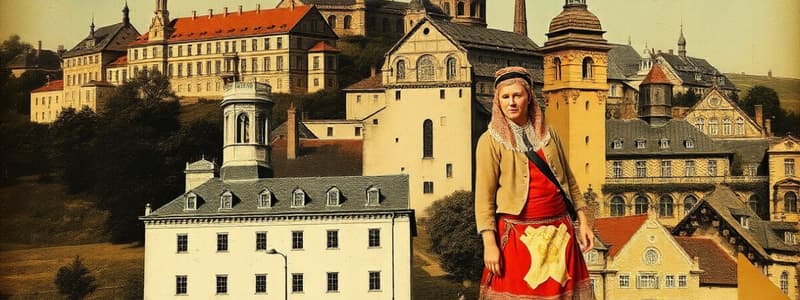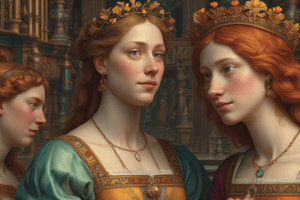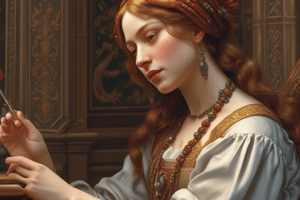Podcast
Questions and Answers
What was the primary goal of government according to Machiavelli?
What was the primary goal of government according to Machiavelli?
- To ensure the happiness of citizens
- To maintain stability (correct)
- To promote democratic values
- To provide extensive education for all
Which painting technique did Albrecht Dürer study during his time in Italy?
Which painting technique did Albrecht Dürer study during his time in Italy?
- Mathematical perspective (correct)
- Watercolor techniques
- Use of oil paints
- Fresco painting
What did Thomas More criticize in his work 'Utopia'?
What did Thomas More criticize in his work 'Utopia'?
- The dependence on mercenaries
- The moral failings of clergy and the Church (correct)
- The wealth of urban families
- The lack of agricultural innovation
What type of soldiers did Machiavelli advocate for in 'The Art of War'?
What type of soldiers did Machiavelli advocate for in 'The Art of War'?
What major event occurred in 1527 related to Holy Roman Emperor Charles V?
What major event occurred in 1527 related to Holy Roman Emperor Charles V?
What is a characteristic of Dutch/Flemish painters during the Renaissance?
What is a characteristic of Dutch/Flemish painters during the Renaissance?
Which of the following best describes the humanist ideas that spread north around 1460?
Which of the following best describes the humanist ideas that spread north around 1460?
Who is known for his humanistic critique of the Church during the Northern Renaissance?
Who is known for his humanistic critique of the Church during the Northern Renaissance?
Flashcards
Machiavelli's political philosophy
Machiavelli's political philosophy
A political philosophy that emphasizes the importance of stability and moral regeneration in government
The Northern Renaissance
The Northern Renaissance
A period in European history that saw the spread of humanist ideas from Italy to Northern Europe
Civic Humanism
Civic Humanism
The concept of creating a more rational and educated citizenry by promoting intellectual and moral development
The Decline of the City-States
The Decline of the City-States
Signup and view all the flashcards
The Italian Wars
The Italian Wars
Signup and view all the flashcards
Christian Humanism
Christian Humanism
Signup and view all the flashcards
Utopia
Utopia
Signup and view all the flashcards
Erasmus of Rotterdam
Erasmus of Rotterdam
Signup and view all the flashcards
Study Notes
The Northern Renaissance
- Humanist ideas spread north from Italy from around 1460.
- These ideas focused on human potential and earthly life.
- Humanists critiqued Church abuses and corruption.
The Decline of City-States
- 1500-1530 saw many battles between city-states.
- France and Spain fought with 32,000 and 14,000 soldiers respectively.
- The Holy Roman Emperor Charles I was in conflict with King Francis I of France, which was allied with the Ottoman Empire.
- The sack of Rome in 1527 weakened many city-states.
- The Peace of Cambrai (1529) ended conflicts for a while.
Northern Art and Humanism
- Wealthy urban families in the Dutch provinces supported artists.
- Artists favoured realism over idealization.
- Northern artists often focused on everyday details.
Erasmus's Humanistic Critique of the Church
- Erasmus of Rotterdam was a Dutch humanist priest.
- He wrote In Praise of Folly and Handbook of the Christian Soldier.
- Erasmus criticized corruption and superstition.
- He tried to bring moral purity back into the Church.
The Rise of Spain
- Spain combined various regions like Castile and Aragon.
- These regions were quite different.
- Castile and Aragon were the most important regions,
- Castile and Aragon were larger than other regions in Spain.
- Spain was a mixture of many small regions combining into one large royal and noble base.
Studying That Suits You
Use AI to generate personalized quizzes and flashcards to suit your learning preferences.
Related Documents
Description
Explore the key concepts of the Northern Renaissance, including the spread of humanist ideas, the conflicts between city-states, and the contributions of notable figures like Erasmus. This quiz delves into art, humanism, and the historical context of the period from 1460 to 1530.




